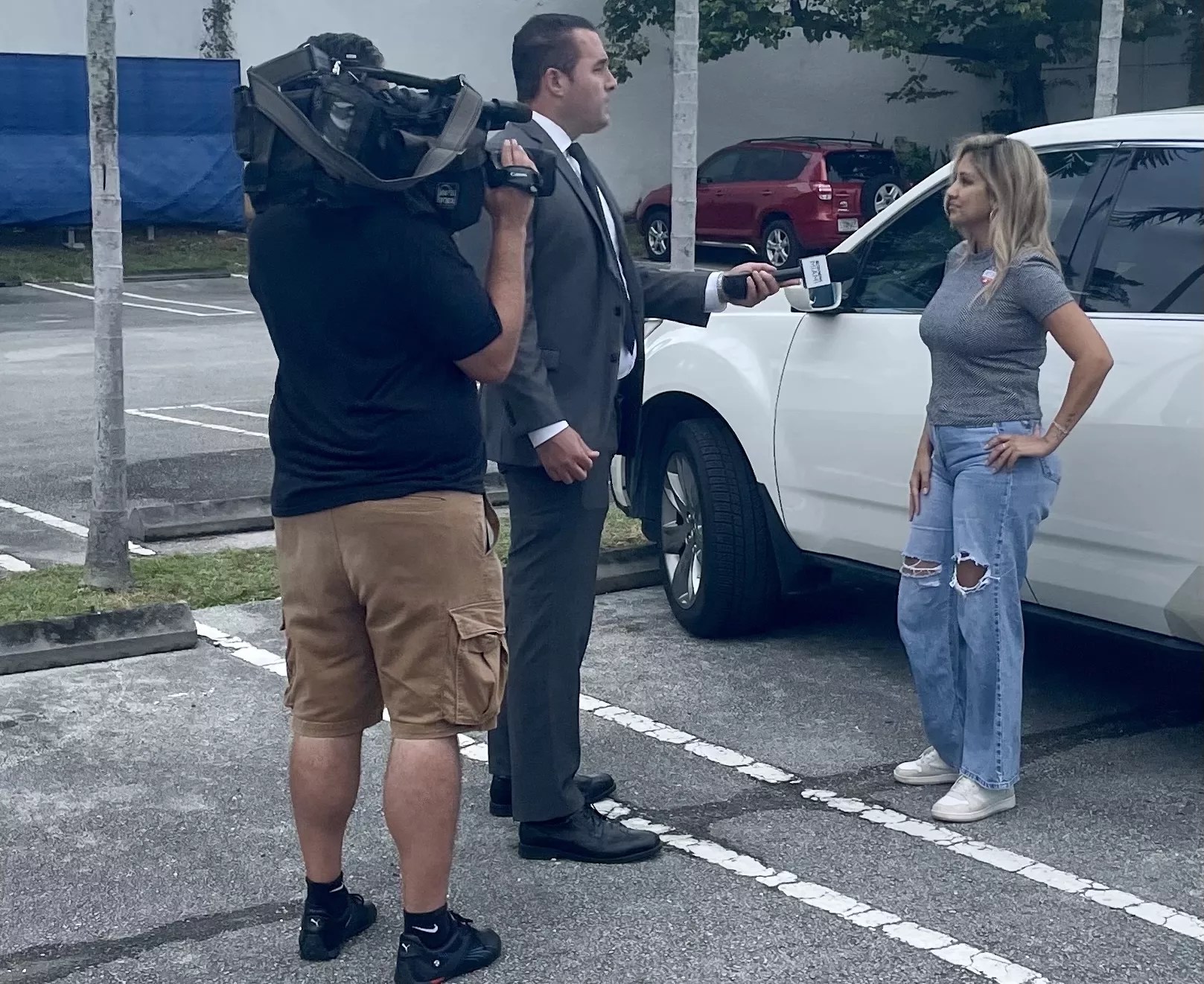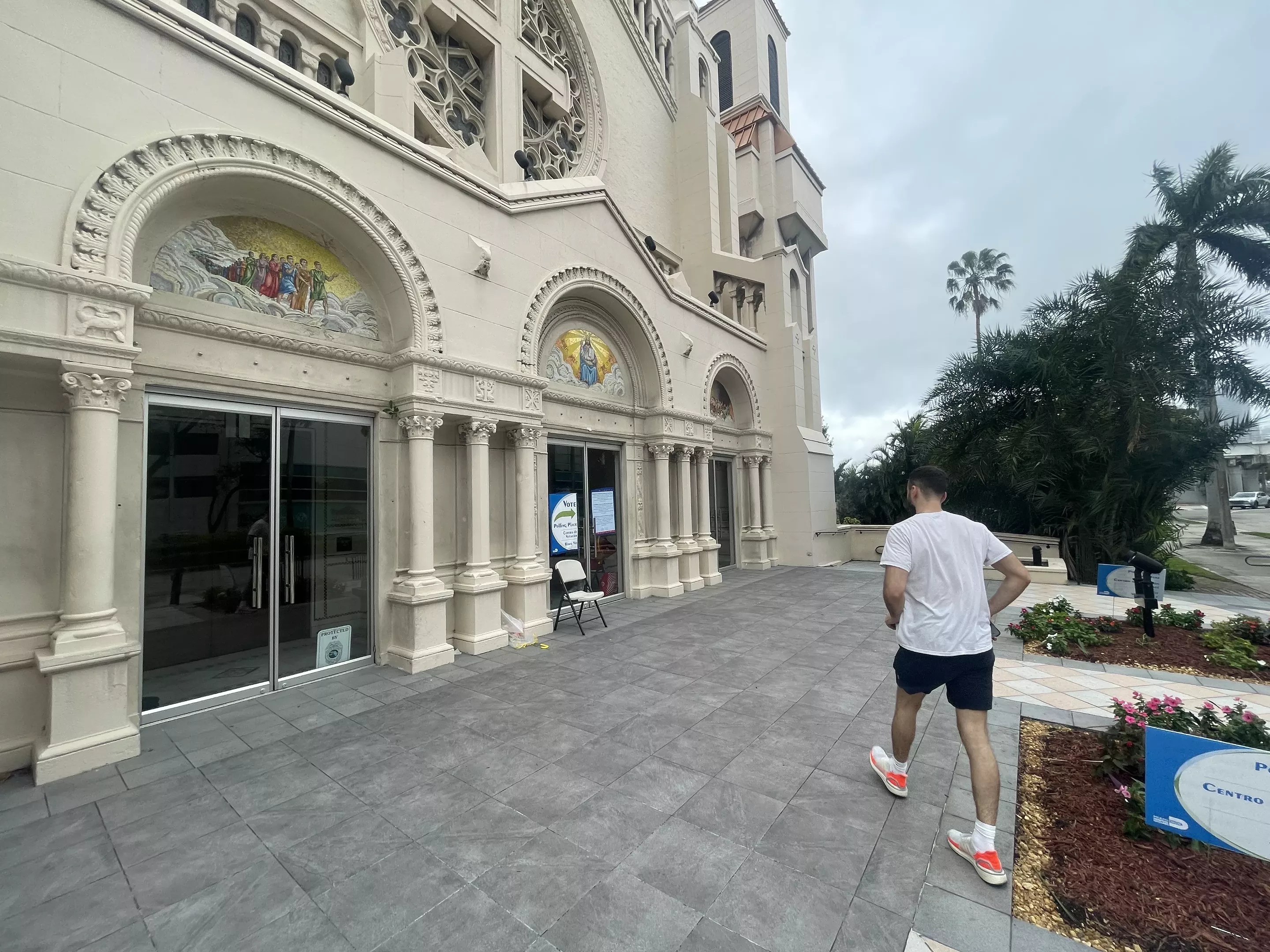
Photo by Tom Finkel

Audio By Carbonatix
Many voters in the Sunshine State who intended to vote in the 2024 general election did so before November 5, either mailing in their ballot or casting it in person during the early-voting period, which opened on October 26.
Still, in South Florida, plenty of people waited until Election Day to mosey out to the polls, and Miami New Times was there to gauge the mood at the end of a historic campaign season, the outcome of which stood to set the tone in the state for the lame-duck years of two-term Republican Gov. Ron DeSantis.
With polls signaling comfortable margins of victory at the top of the GOP ticket, DeSantis had thrown down the gauntlet a little way down-ballot, staking his increasingly far-right bona fides on defeating two of the six proposed amendments to the state constitution: legalization of recreational marijuana (Amendment 3), and the right to abortion (Amendment 4).
As it turned out, there wasn’t much of a window for suspense after the polls closed at 7 p.m. Within two hours, major networks declared that Donald Trump had won the state and Amendments 3 and 4 were destined for defeat – though both had secured a comfortable majority, Florida requires a 60 percent supermajority for an amendment to the state constitution to pass. The results were perhaps even starker in Miami-Dade County, which went red in the presidential race – and decidedly so – for the first time in what seems like forever. (Broward County stayed resolutely blue, Palm Beach County a paler cyan hue.)
New Times reporters had spent the day covering the various races with particular attention to the mood at polling places around Miami-Dade and Broward. Below are vignettes from a handful of precincts.
Little Haiti Cultural Complex
Voter traffic was sparse at the Little Haiti Cultural Complex on NE Second Avenue on a breezy but mostly dry Tuesday afternoon. Beaucoup spaces in the parking lot, more campaign signs and pamphleteers than actual voters – so much so that a CBS TV reporter who arrived around the same time mistook us for the proverbial man on the street and uttered his icebreaker: “I heard there was some trouble with the state election website this morning. Did you have any trouble finding your polling place?”
Imagine his surprise when we told him New Times had broken that story hours ago.
Having straightened out our respective identities, Steve Maugeri made a beeline for a more suitable victim in the parking lot (“I knew when I saw her take out her phone – the Election Day selfie!”), and after admiring his technique, we made our way to the cultural center.
In less than a heartbeat, a blue-shirted volunteer greeted us with a hearty “Thanks for voting!” and proffered her glossy cards. Once again, we identified ourselves, this time clarifying that it was us who’d come to interview her.
Like us, this is Wendy Mendoza’s voting precinct. She’d been on the scene all weekend and reported that while today was the slowest in terms of traffic, the flow was steady.
And, she added, there were three women voters for every man. “It was a good mood,” she said. “Women coming to vote with their children, their daughters. Every day.”
She said it not with surprise but with purpose. Unlike her pamphlet partner on this day, 2024 wasn’t Mendoza’s first time volunteering at the polls. She first caught the fever two decades ago when she heard Barack Obama deliver the keynote at the 2004 Democratic convention.
Now, she said, she’s the mother of twin daughters herself, and she’s determined to preserve democracy. And equally crucial in this reddening state and county is a woman’s right to make decisions about her own body.
But she wasn’t kidding herself. “The Democratic Party has a lot of work to do,” she said. “Democrats have a 1 million voter deficit” in the state. “The party needs a fresh start. We have to start from scratch.”
Mendoza places much of the blame on Nikki Fried, who, as Florida Democratic Party chair, “did nothing” to reinvigorate the moribund political organization. Though she estimated that it would take eight to ten years to undo the damage she sees as largely self-inflicted, she expressed optimism that a woman like Miami-Dade Mayor Daniella Levine Cava might mount a successful campaign for governor.
Added Mendoza: “Men have had the power for too long.” -Tom Finkel
YMCA Familly Center, Pembroke Pines
Maybe it was the rain, maybe the time of the day, maybe the early voting turnout – but at one o’clock in Pembroke Pines, many of the polling stations felt like ghost towns.
As at other sites across this south Broward municipality, the flow of voters in and out of the Pembroke Pines YMCA Family Center was more like a trickle, not unlike the rain that came and went, falling on the campaign volunteers gathered outside but not dampening their enthusiasm.
Hildah Jong-Ebot was one of the handful who dodged the on-and-off drizzle to hurry inside to vote.
As she left with her 7-year-old daughter, Malu – who sported a pink Inter Miami T-shirt featuring Leo Messi’s face, along with a small “I Voted” sticker – Jong-Ebot explained that voting today was important to her because she believes all Americans should exercise their right to choose their leaders.
The longtime Pembroke Pines resident added that she sees the government as not just the people elected to office but “all of us.”
“My reason to choose who I chose today is because I value where they will take me. I want somebody that will lead by example, who will do what they promise,” she said. “That’s why I chose Kamala Harris.”
Online election data shows that the majority of eligible voters at the YMCA precinct voted early.
While 1,344 of the precinct’s eligible voters voted by mail, 2,332 voted early, and only 475 had voted on Election Day as of 3 p.m., according to Broward County Supervisor of Elections data. -Alex DeLuca

A voter approaches the polling station at Trinity Cathedral near Biscayne Bay in downtown Miami.
Photo by Zulekha Pitts
Trinity Cathedral, Downtown Miami
Election Day at Trinity Cathedral Hall, where downtown Miami meets Edgewater, saw steady turnout despite occasional rain, bringing a diverse mix of voters, photographers, and advocates to the church doors. By early afternoon, the location had seen more than 500 voters. “You just missed a big crowd,” remarked the poll worker who greeted us at the entrance around 1:30.
Outside on the steps, a visitor from Brazil snapped photos of the building. “I’ve never seen voting take place in a church,” he said.”Maybe a school, but not a church.” Though not voting, he shared his opinion as he left, saying he hoped Trump would win.
Inside, a poll worker who said her name was Shantee reflected on the day’s turnout as she signed in voters. “It’s been going really well. Even though it’s been raining, we’ve had a lot of voters come in today.”
For Shantee, the election holds personal significance, particularly with a woman running for president. “I think it means everything,” she explained. “I believe that it’s a mark in history. Women feel like, ‘Wow, if she can do it, I can do it.'”
She also touched on Amendment 4. “Women should have their own say-so with what happens to their bodies,” she said. “No one has the right to take that away. If you do have something like that, there’s going to be a lot of women who kill themselves. People will just abort it themselves. Every woman should have her own voice, her own right, and her own belief.”
Edgewater resident and MyBallotAI founder Mark Larman also turned out to cast his ballot, noting how his app helps voters access ballot information.
“Four years ago, when I was voting right after George Floyd was murdered, I didn’t know who the judges were,” he recalled. “And you’re kind of flipping a coin on their whole career. When AI became democratized, I thought, If you put AI in front of it, it makes it easier, maybe a fun experience to learn about what’s on the ballot.”
Reflecting on the election’s historic moment, Larman, a Black man, added, “It’s about time a Black woman has the chance to get in there. It expands people’s thoughts.” He also looked forward to Harris’s leadership style: “I think she’ll lead in a way that’s very thoughtful.”
Miami-Dade School Board candidate Martin Karp was on the premises, promoting his run for the District 3 seat.
“Right now, we’re the third-largest school district in the country, and we have a lot of amazing things we can do here,” he said.
He paused to greet a passing voter, then continued, expressing his commitment to engaging students with Miami’s local industries to keep them here after graduation.
As she exited after voting, Tatiana Moreira shared her view on participation in a democracy.
“How can you say what you want or don’t if you don’t vote? I googled where to vote. They give you the address and everything. It’s really easy, so everybody should come and vote.” -Zulekha Pitts
Watsco Center, University of Miami
The University of Miami’s Coral Gables campus was remarkably empty on Tuesday morning. No students tabling in the breezeway. No last-minute campaigns. No protests. The only sign that it was Election Day was a slight increase in Trump-themed caps and pro-recreational marijuana “Yes on 3” shirts.
Hours later, the school’s newspaper, the Hurricane, would report that for a time, students attempting to vote at the polling station at the Watsco Center were turned away by poll workers who didn’t understand the election laws regarding ID requirements.
The students reflected the calmer atmosphere, voicing a hope for “peace” and “democracy” in the days to come as opposed to one candidate’s victory.
“It seems like this is one of the schools where everyone keeps their opinion to themselves,” one junior said, adding that he appreciated the relative calm surrounding the election and the absence of hostility. “People go about their day not caring about who people vote for.”
A student who identified herself as a Trump voter agreed. “I find UM as very respectful of either person’s political views, but it hasn’t really been an issue for me,” she said.
She was hoping to get stopped by Right Side Reels, an increasingly popular TikTok account that posts man-on-the-street style interviews at UM and Florida International University. The videos usually feature a passerby talking about why they plan to vote for Trump in 2024. Most interviewees wear bootleg Trump hats that substitute the letter U with UM’s stylized version.
Some students expressed interest in Florida’s proposed constitutional amendments on abortion and recreational marijuana.
“The amendments to me were more important because those affect my day-to-day life a little more,” a student voter shared. “The presidency is just a person. I don’t really care at that point.”
Another student, a Maryland native, said, “I think abortion is the most important,” explaining that the presence of Amendment 4 on the ballot was instrumental in her decision to vote in Florida rather than in her reliably blue home state. “I figured my vote would count more here than in Maryland.” -Patrick McCaslin